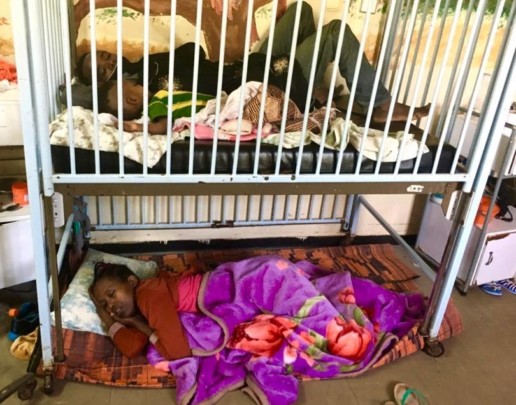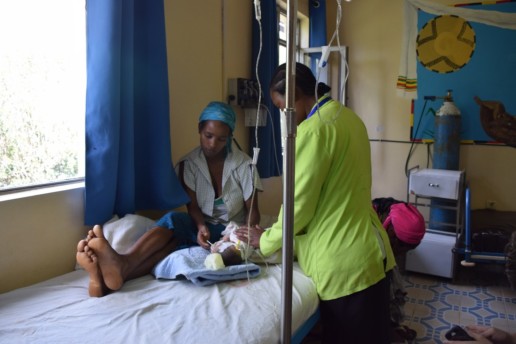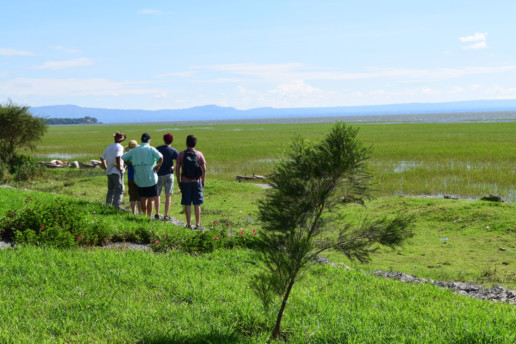Amazing transformation
January 23, 2018Uncategorized,Culture,General,Medical Care,Missionary Medicine,Patient Stories
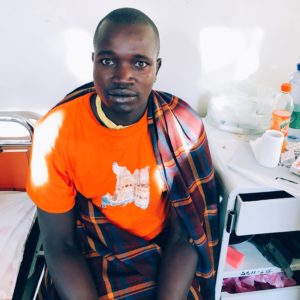
A young man came to our hospital from a region to the east. Something was causing pain in his leg, so he and his best friend traveled to Soddo Christian Hospital because they knew he would receive excellent care.
About a year ago, a group of Ethiopian Christians from Soddo went to the region of these young men to share the gospel. However, the outreach group purposely decided not to go to the village of these two men because of the violent reputation of this tribe. They are known for killing up to 30 people in retribution for a single offense.
While the patient and his friend, both from this violent tribe, were at Soddo Christian Hospital, they watched the Jesus Film, and one of our hospital chaplains visited with them. God had touched the heart of the patient's friend, and he was gloriously saved! Not only that, but the new believer is the son of the king of this tribe. He has returned to his home, eager to share the love and truth he found in Christ with his family and tribe.
The son of a king has become a son of the King of Kings. There is much rejoicing here.
Surgical Treatment of Chronic Elbow Dislocation Allowing for Early Range of Motion: Operative Technique and Clinical Results
December 26, 2017Uncategorized,Medical Care,Missionary Medicine,Patient Stories,Training
Surgical Treatment of Chronic Elbow Dislocation Allowing for Early Range of Motion: Operative Technique and Clinical Results
This is the largest case series of surgically treated patients with chronic elbow dislocation. Using our surgical technique, 97% of patients had good or excellent outcome with a low complication rate. Open reduction of chronic elbow dislocation can be accomplished while permitting early motion with minimal recurrent dislocation risk.
We have developed a straightforward surgical technique that allows for early elbow range of motion (ROM) with a little risk of recurrent instability. We present the operative technique and results of this surgical technique from 2 tertiary centers in Ethiopia. Our hypothesis is that our surgical technique and postoperative rehabilitation protocol allows for good patient outcome regardless of injury duration.
Duane R. Anderson, MD,* Justin M. Haller, MD,† Lucas A. Anderson, MD,† Samuel Hailu, MD,‡ Abebe Chala, PT,* and Shawn W. O’Driscoll, MD, PhD§
Rheumatic heart disease early detection
Sonosite Ultrasound hard at work one day after arrival. We have already identified 4 cases of Rheumatic Heart Disease. Dr Ron Johannson is training our staff on identification and early treatment options.
Their website in Lifestream Founation. Ron and his wife, Colleen, have been traveling the world for over 30 year training mission hospitals.
In 1981 they went on their first overseas mission. Their focus has been on medical education, leaving tools for those who are called to serve the poor.
They continue to teach and provide medical care in resource limited areas. Their goal is to improve the lives of the people they serve in the name of Christ.
"Christian" is his new name
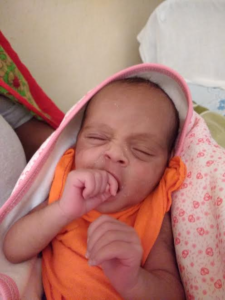
Our hospital has a growing pediatric and neonatal service. We just opened our new Neonatal ICU (NICU) 5 months ago and have seen some great results, not just from physical, but from a spiritual perspective.
Our hospital has a three pronged vision statement:
- to provide excellent medical care,
- to make disciples
- and to share the gospel.
In 2017, the chaplains at SCH shared the gospel with 28,714 patients and visitors, resulting in 218 people placing their faith in Jesus Christ.
In our Neonatal Intensive Care Unit (NICU), we have come to understand the importance of a child’s name. In Ethiopia, a child’s name often represents the conditions surrounding their birth. Sometimes a child is named “The Rain” or “Patience,” and other times it has deeper meaning.
About one month ago, in our NICU we admitted a very sick three-week-old neonate named Bochore. His family were members of the traditional Ethiopian Orthodox Church. He had very severe pneumonia. He had started treatment elsewhere, but didn’t see improvement. In fact at our hospital it was a very difficult battle, because despite our first line and second line treatments, Bochore did not improve. Every day, we would pray with Bochore and his family, for the love of Christ to be evident through us and for his healing.
After nearly four weeks in our hospital on oxygen, he was finally discharged. Every day for a month, we prayed with this family. Every day for a month, we shared who Jesus is in our actions and our words. Every day, our hospital chaplains would spend extra time with this family. At the end of their stay, the child’s mother and grandmother cried and cried. They had felt the love of Christ and wanted that in their lives. The mother professed Christ as her Lord and they changed the child’s name. His new name was Christian.
Would you consider a gift to allow us to further expand this important department? You can donate here
Our Pediatric ward is crowded
May 22, 2017General,Medical Care,Fundraising,Patient Stories
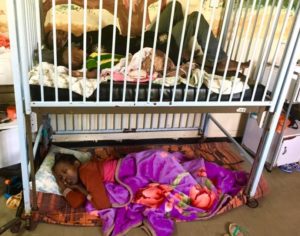
 This week, I was amazed at how crowded the hospital grounds are. I quickly learned that families stay on the property when their loved ones are hospitalized. When all beds are filled, which is a common occurrence, some sick and injured patients stay in the yard waiting for a vacancy. Families huddle together, sleep under a tree or under the shelter of overhangs with few complaints. Above, is the pediatric ward, which is one large room with multiple beds. It is not uncommon to see family members share a bed or sleep on the ground next to the hospital bed. For those who have not been here, imagine 6 hospital beds and 6 families, sharing one large room.
This week, I was amazed at how crowded the hospital grounds are. I quickly learned that families stay on the property when their loved ones are hospitalized. When all beds are filled, which is a common occurrence, some sick and injured patients stay in the yard waiting for a vacancy. Families huddle together, sleep under a tree or under the shelter of overhangs with few complaints. Above, is the pediatric ward, which is one large room with multiple beds. It is not uncommon to see family members share a bed or sleep on the ground next to the hospital bed. For those who have not been here, imagine 6 hospital beds and 6 families, sharing one large room.
Today, we took care of a 4 year old child who had fallen from a mango tree, had an open distal radius and ulna fracture with the radius coming out of the skin. There was mud and grass on the visible end of the bone coming through the skin. We were able to take the patient to the operating room, remove the debris and mud, reduce the fracture and pin it back into place. Dilute bleach is used as irrigation in the operating room, and almost every patient’s wounds are cleaned with dilute bleach daily while they are in the hospital. It has proven to be extremely effective.
I am grateful to UCLA and OIC to have had the opportunity to come visit and help in Ethiopia, and look forward to another exciting week!
Would you consider a gift to our Benevolence Fund to help our poorest patients?
These notes and photos were provided by:
> Ed Cheung
> UCLA Orthopaedic Surgery
Yehone, "his name means, "Let it be"
May 17, 2017General,Medical Care,Fundraising,Patient Stories
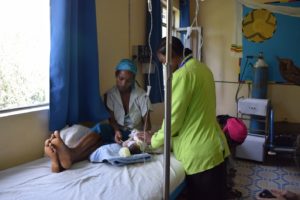
![]()
![]()
 Yehone is a newborn baby at Soddo Christian Hospital. “Let It Be” is the meaning of his name, but that is an impossible task for his young mother and grandmother, both of whom anxiously await the outcome of a surgery on which they’ve just been debriefed. Yehone’s family has traveled to Soddo from their local hospital 50 kilometers away. His grandmother explains that Yehone is the first-born child of her daughter, who is young, fatherless, and recently married. The tiny child in her arms is the prize of this family. Twenty days after his birth, Yehone’s family knew that he was fatally ill, with a distended stomach and unrelenting vomiting. They sought diagnoses and treatment at the hospital nearest them, but did not have enough money to pay for the child’s care. They were sent to Soddo Christian Hospital, where a Benevolence Fund will help pay for life-saving treatment they cannot afford. Yehone’s family used everything they had to make it to the hospital in Soddo. Today, Yehone will undergo an operation to heal the root of his illness - an intestinal malrotation.
Yehone is a newborn baby at Soddo Christian Hospital. “Let It Be” is the meaning of his name, but that is an impossible task for his young mother and grandmother, both of whom anxiously await the outcome of a surgery on which they’ve just been debriefed. Yehone’s family has traveled to Soddo from their local hospital 50 kilometers away. His grandmother explains that Yehone is the first-born child of her daughter, who is young, fatherless, and recently married. The tiny child in her arms is the prize of this family. Twenty days after his birth, Yehone’s family knew that he was fatally ill, with a distended stomach and unrelenting vomiting. They sought diagnoses and treatment at the hospital nearest them, but did not have enough money to pay for the child’s care. They were sent to Soddo Christian Hospital, where a Benevolence Fund will help pay for life-saving treatment they cannot afford. Yehone’s family used everything they had to make it to the hospital in Soddo. Today, Yehone will undergo an operation to heal the root of his illness - an intestinal malrotation.
Dr. Michelle explains to the mother and grandmother the need for this operation, assuring them that God has already protected their child, that his life today is reason to give thanks to God, and that we must continue to entrust the child’s care to God through prayer. Ayellech, a hospital chaplain, is in the room to pray for the baby and family. The women are both timid, they are afraid of the surgery and do not believe their precious one will make it through; “He is so small,” what if he does not wake up? The gnawing, clenching feeling of fear is evident on the women’s faces. Ayellech places her hands on the child and his mother, and prays powerfully for the baby’s life. When the prayer finishes, she does not stand up and walk away. She holds the mother’s shoulder and asks, “Why did you not say ‘Amen?’” Do you not know that God is good? The women look worried, but they know that this is their hope, that they must put their trust in the doctors here to save their child; it is through the faith and evangelism of the staff that they are led instead to  put their faith in God. “God is the only physician who can save this baby,” Dr. Yates explains before she prays for the family, “So we must pray.”
put their faith in God. “God is the only physician who can save this baby,” Dr. Yates explains before she prays for the family, “So we must pray.”
“God has given us an opportunity to share the gospel here…to people who come from all corners and all tribes of Ethiopia,” explains Tesfaye, another hospital chaplain, “I cannot share the gospel more anywhere else.”
Soddo Christian Hospital provides more than physical healing, but it is only through the lifesaving care of the doctors that this opportunity arises.
When Yehone’s family arrived at Soddo, they had spent everything they had on transportation to the hospital. They had nothing left to pay for treatment.
The Benevolence Fund is currently very short of funds. We used $113,000 to fund Benevolence Patients in 2016, wiping out our reserves.
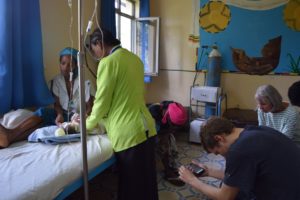 For Yehone and his family, the hospital’s reserve Benevolence Fund (which has been set aside for pregnant mothers) is being re-allocated to cover the surgery and medicine costs for Yehone, in addition to food for his mother and grandmother. Because of this resource, Yehone and his family will remain in the hospital while he undergoes treatment; they will be in the care of the hospital’s doctors, nurses, and chaplains, who will continue to share with them the love of Christ, and the hope of new life given by Jesus.
For Yehone and his family, the hospital’s reserve Benevolence Fund (which has been set aside for pregnant mothers) is being re-allocated to cover the surgery and medicine costs for Yehone, in addition to food for his mother and grandmother. Because of this resource, Yehone and his family will remain in the hospital while he undergoes treatment; they will be in the care of the hospital’s doctors, nurses, and chaplains, who will continue to share with them the love of Christ, and the hope of new life given by Jesus.
There is now an immense need to replenish the hospital’s Benevolence Fund, which in the past has been lifesaving to hundreds of patients – thanks to the generosity of donors. This is a major resource to provide opportunities for the staff to serve the poor; it is the means through which Soddo Christian Hospital shares the gospel with those who both need and desire it the most.
With your donation, Soddo Christian Hospital can continue to provide this much-needed care and hope to the neediest in Ethiopia. Will you help?
Yehone’s surgery was successful. He is now recovering! Thank you God!
You can give online at:
Doctor helps at-risk women
May 5, 2017Medical Careat-risk women,ethiopia,health care,karnes,women,WRAPS

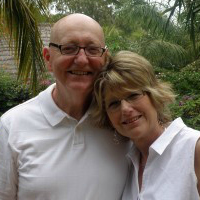 Dr. Mark Karnes likens the work he does to a well-known Christian proverb: "Teach a man to fish, and you've fed him for a lifetime."
Dr. Mark Karnes likens the work he does to a well-known Christian proverb: "Teach a man to fish, and you've fed him for a lifetime."
Both as a Christian and an OB/GYN, he hopes to achieve a lasting impact in Ethiopian health care by treating at-risk women and instructing other medical professionals there.
The 1967 Heath High School graduate grew up "right on the McCracken and Ballard County line," eventually moving to Cameroon for five years as a medical missionary after his internship. Karnes said he again "felt called" to Africa with his wife, Allison, after 25 years of practicing in Michigan.
The couple returned to Paducah in April for a funeral and to visit with family. While in town, he spoke with The Sun about his medical career overseas.
Since 2010 Mark has been on-call "24 hours a day, seven days a week" at the 140-bed Soddo Christian Hospital in the Wolaitta region of southern Ethiopia.
"Christ first healed people, then taught them," Mark said. "Part of our work is (also) training African doctors in the field of surgery, so they'll be able to carry on.
"It's one thing to do a caesarean section myself to save the life of a mother and child, but to teach (another) how to do the same operation is a great thing."
Initially he was one of two OB/GYNs for a population of roughly 2.5 million. Three others have arrived to the region since then.
"When (my wife and I) first went to Ethiopia, 94 percent of women delivered at home without a health care professional," he said. "I'd say that number is probably 60 percent now."
Despite progress, both Mark and Allison said issues remain.
While the Ethiopian government has encouraged more medical schools and training, Mark said many native physicians graduate only to work abroad.
Cases of uterine prolapse and molar pregnancies -- where an undeveloped fetus causes harm to the mother -- also threaten the well-being of his patients.
"We've lost patients simply from lack of blood," he said. "In the states I never lost a patient or a mother from that, but in Ethiopia it's a different world."
Allison credited the Ethiopian government for a "substantial difference," saying the Wolaitta region has expanded to a university of about 15,000 students and a medical school.
"I give them a tremendous amount of credit, because they really want to improve the system there," Allison said. "You're seeing health care in the country (also) really begin to improve."
She's brought her own cause to the region as director of WRAPS -- Washable, Reusable, Affordable Pads -- a nonprofit providing clean sanitary pads and access to education for Ethiopian schoolgirls. Her organization addresses hygiene, menstruation, staying in school and overcoming disadvantages.
"(Mark and I) both have a passion for changing the lives of women in Ethiopia," Allison said. "I see injustices there done to women -- forced marriage, rape -- and it's a horrific system for rural schoolgirls.
"The government is striving hard to change that, but in the rural areas it's still far behind."
Allison added the country's road system in rural areas has improved greatly -- aiding the work they do.
"I used to have (patients) walk three hours to the road, then take a taxi for hours to get to me," Mark said. "I think it's gotten better."
Visit soddo.org to see about potential ways to get involved. Mark and Allison Karnes also host a blog at soddospecialdelivery.org.
S
National Maternal Mortality rate has been cut in half!

We have had some wonderful success stories as well with the delivery of one mother six weeks early who also had preeclampsia but has gone home with a live baby. Dr. Ross has been a Godsend to us. We also have a new GP, named Dr. Sifora. She has spent the past month with me in OB and has been a wonderful asset to me. She is a recent graduate of medical school in the Philippines and would like to become an OB/GYN in the future. Dr. Sheryl Ross has her PhD in leadership and has been giving leadership training to our nursing, administration and chaplain staff.
We are very grateful that Dr. Nate Ross, an OB/GYN from Alabama, and his wife Sheryl are spending this month helping us out.
You know you’re a missionary in Africa when . . .
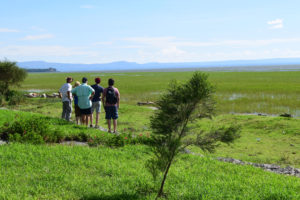 We’re guessing that some of you reading this were probably fans of the Late Show with David Lettermen. Each Late Show would end with a goofy “top ten” list (“Ten Reasons that Captain Kangaroo should be president of the United St.ates, that sort of thing). As part of our newsletter today, we’ve decided to do our own top ten list. Well, actually it’s a top eight list, because we felt like ten was a little too long-winded. So today we proudly present to you “Eight Ways to Know You’re A Missionary in Africa.”
We’re guessing that some of you reading this were probably fans of the Late Show with David Lettermen. Each Late Show would end with a goofy “top ten” list (“Ten Reasons that Captain Kangaroo should be president of the United St.ates, that sort of thing). As part of our newsletter today, we’ve decided to do our own top ten list. Well, actually it’s a top eight list, because we felt like ten was a little too long-winded. So today we proudly present to you “Eight Ways to Know You’re A Missionary in Africa.”
We find humor, beauty and faith-building in everything you’re about to read on this list. We hope that it gives you, our faithful friends and supporters, a little bit of a behind-the-scenes peek into what life is like on the African mission field.
And now without further adieu, you know you’re a missionary in Africa when:
De-worming isn’t just for your dog. It’s true! Twice a year, every member of the Canfield family takes a yummy little pill that kills off any “friends” our intestines might have picked up (the pill has no side effects). Thankfully, the medicine has worked and we haven’t had any unwanted stomach visitors yet. But worms in Ethiopia are fairly easy to get from fruit and contaminated food. So the next time you pick up worm medicine for your pet, you think can think of us.
Potato chips are one of your most valued treasures. We won’t lie – when we lived in the US, Trader Joe’s potato chips were one of our favorites. No Trader Joe’s here. Sometimes at one of the tiny local stores here we can find a brand of chips called Mr. Potato. They’re basically the African version of Pringles chips, complete in a tall, slender can. When we do find a can of these, the celebration that follows would make you think we just won the lottery. But no, we’re just really excited about a bit of highly processed fat and salt.
Candles aren’t decorations. The power goes out here. A lot. Usually a few times a day. Our longest stretch with no power was four months, as we shared in our last newsletter. So we’ve gotten used to eating, reading,washing dishes, etc. by the light of candles. We were so blessed to have one of our friends and supporters in Oregon send us a gift of a new portable generator for our house. We can get gas to run it a few hours a day during the bad power outages. But our eyes have developed a somewhat cat-like ability to see in the dark.
Your definition of “clean” changes (dramatically). Between power outages and water shortages, showers can be a rarity, especially during the dry season. Jackson and Oliver actually love this, as they’ve never been really big big fans of bathing.
Bugs and reptiles in your house don’t bother you. The variety of animals in Africa is absolutely stunning. There are so many small creatures here that look like they stepped out of a psychedelic dream. The catch is that many of them crawl, fly or slither into our house on a regular basis. It’s not uncommon to grab a dish off the shelf and find a striped lizard sleeping underneath. Or to step out of bed in the morning and disturb a horned beetle slowly making its way across the floor. There’s no way to keep them out, so for the most part we just laugh and admire them (although Brad was not a fan of the black tarantula in our kitchen).
Your morning commute involves dodging donkeys. There’s nothing like traffic in Africa. It’s perhaps comparable to driving through a massive, out-of-control circus – fascinating, amusing and sometimes alarming. Every time we drive from our house to the hospital, we swerve around packs of donkeys (far more numerous than cars), chickens, goats, three-wheeled bajaj taxis, and oceans of people. We praise God after every drive that we didn’t hit anyone or anything.
You take “coffee snob” to a whole new level. In our biased opinion, east Africa produces the best coffee in the world, and Ethiopia is known as the birthplace of coffee. Back in our home state of Oregon, there’s a coffee shop called Stumptown is that at the epi-center of the “coffee snob” culture. The kind of place where people in plaid shirts sit around sipping $10 cups of joe and commenting about “floral notes.” Well, the folks at Stumptown can only dream of sitting on a terrace overlooking the mountains of Ethiopia, drinking coffee that was grown and roasted about a mile down the road on a small farm, and slow-brewed in a jebena pot over a coal fire. The scenes that you see on the big posters in Starbucks, we get to live every day. What can we say, we’re proud of our adopted country!
You believe in miracles, because you see them happen all the time. As Christians living in the US, it was often easy for us to give lip-service to the idea that God works miracles, without fully believing it in our hearts. The blessings of modern medicine and the relative security of living in America often made super-natural intervention in our lives seem unnecessary. It’s different in Ethiopia. Miracles are how people survive here. There’s no rain for months for crops; so the people in our city hold an all-night prayer meeting, and the next day it pours (and the next and the next). Patients come to Soddo Christian Hospital with medical problems that should mean death, with conditions that should be incurable. Our staff pray for them (and also provide great care), and the patients walk out of the hospital healthy. Mysterious, massive tumors disappear. Horrible diseases evaporate into thin air. It’s easy to discount the supernatural when you don’t really need it. Our perspectives have been changed because we do need it. Every day.
Post by: Brad Canfield



